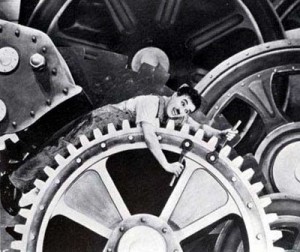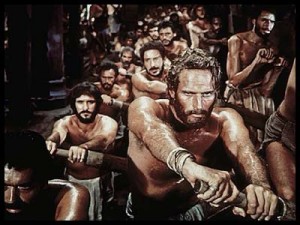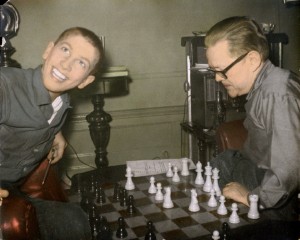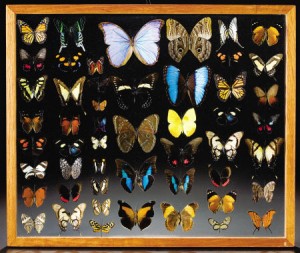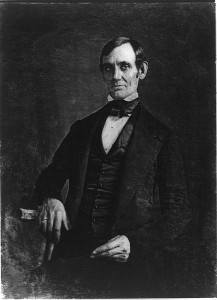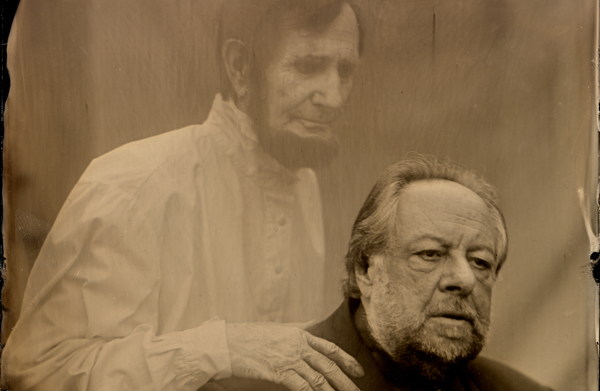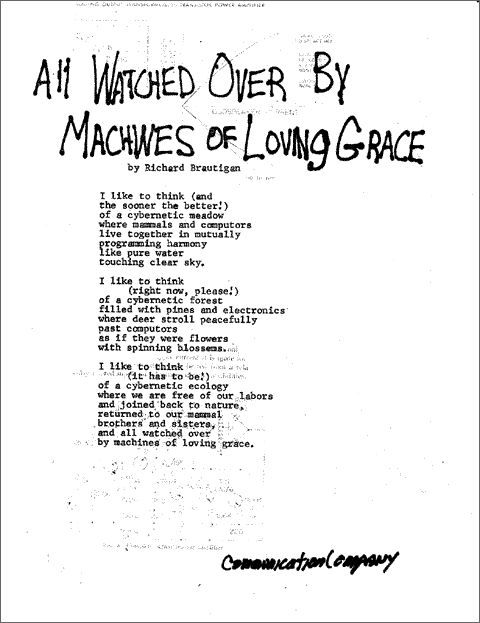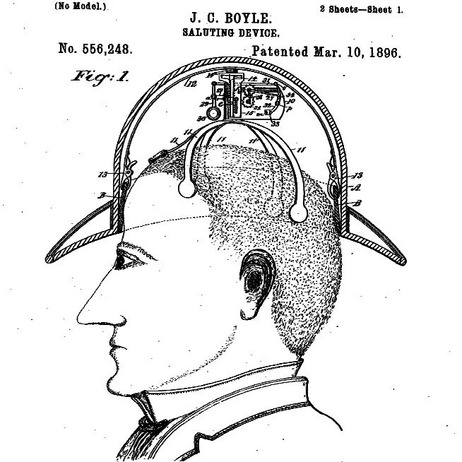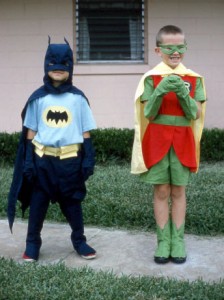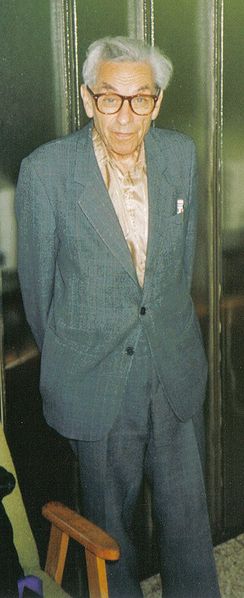Acchan Miyan, 42, is paid to scare away real monkeys in Lucknow, India.
You are currently browsing the archive for the Urban Studies category.
Everyone who supported the “Detroit Needs A RoboCop Statue” effort, which I posted about earlier, will see their dream come true. In just seven days, the Kickstarter campaign has raised a stunning $50,103. (It would seem that one person matched the initial $25K.) At last, a little good news for Detroit.
••••••••••
ORIGINAL POST:
“None Of Us Have Ever Made A Giant Solid Metal Permanent Sculpture Before”
Detroit may be down in the dumps, but the fine citizens aren’t letting Mayor Dave Bing‘s refusal to allocate funds for a RoboCop statue keep them from their dreams. They’ve begun a Kickstarter campaign to raise the necessary cash. (Thanks MLive and Reddit.) An excerpt:
“None of us have ever made a giant solid metal permanent sculpture before. It turns out to be a pretty expensive process (who would have thought?), but not too much for the world to fund. After talking to numerous sculptors and metal workers, the current game plan is this: We can take a relatively small figure of RoboCop (conceivably even an action figure), have it 3D scanned by lasers (cool!) and scale its form to create a light-weight model of any size we’d like, which can then be used to pour and cast liquid metal.”
In 1997, Canadian forest engineer Grant Hadwin was unemployed but not unindustrious. That was bed news for a unique tree in British Columbia dubbed “Kiidk’yaas,” the only Golden Spruce in the world. In some sort of misguided political protest against the logging industry, Hadwin stealthily felled the tree and shocked a nation. The almost-mythical Hadwin, a seemingly indestructible man who was known for taking swims outdoors when temperatures reached 35 below, was the subject of John Baillant‘s excellent 2002 New Yorker article, “The Golden Bough.” An excerpt:
“Hadwin was well known for outdoing his co-workers. Paul Bernier, a longtime colleague and close friend of his, told me, ‘He was in the best condition of any man I’ve ever seen.’ Bernier was with Hadwin when he outwitted a pair of charging grizzly bears by dodging across a stream and feinting upwind, where they couldn’t smell him. In addition to consuming prodigious quantities of chewing tobacco, Hadwin was known for buying vodka by the case and going on spectacular binges that, even in freezing weather, would leave him unconscious in the back of his vintage Studebaker pickup or passed out in a snow-filled ditch, dressed only in slacks and shirtsleeves. There was a local joke: ‘Look, that snowbank is moving. Must be Grant.’
Early photographs of Hadwin show a fine-boned, handsome man, slightly less than six feet tall and built like a distance runner. People who knew him during his Gold Bridge days likened his lean, sharp-eyed appearance and remote manner to Clint Eastwood’s. Quiet and courteous though Hadwin usually was, he possessed an almost tangible intensity, a piercing, in-your-face conviction that some found alarming. ‘He always had to be the best, had to be first,’ his Aunt Barbara recalled. ‘It always had to be Grant’s way. There was never any room for compromise.'”
Tags: Grant Hadwin, John Baillant, Paul Bernier
On his site, Kevin Kelly’s opines on “Seeking Sustainable Disequilibrium,” which seems to be happening whether we seek it or not, as we ride the wave of the great paradigm shift through the Information Age. An excerpt:
“In the industrial perspective, the economy was a machine that was to be tweaked to optimal efficiency, and once finely tuned, maintained in productive harmony. Companies or industries especially productive of jobs or goods had to be protected and cherished at all costs, as if these firms were rare watches in a glass case.
As networks have permeated our world, the economy has come to resemble an ecology of organisms, interlinked and coevolving, constantly in flux, deeply tangled, ever expanding at its edges. As we know from recent ecological studies, no balance exists in nature; rather, as evolution proceeds, there is perpetual disruption as new species displace old, as natural biomes shift in their makeup, and as organisms and environments transform each other.
Even the archetypal glories of hardwood forests or coastal wetlands, with their apparent wondrous harmony of species, are temporary federations on the move. Harmony in nature is fleeting. Over relatively short periods of biological time, the mix of species churns, the location of ecosystems drift, and the roster of animals and plants changes as they come and go.
So it is with network perspective: companies come and go quickly, careers are patchworks of vocations, industries are indefinite groupings of fluctuating firms.”
Tags: Kevin Kelly
A short documentary about Scott Schulman, whose fashion blog, The Sartorialist, features his photos of stylish sorts he meets on the street.
Tags: Scott Schulman
I looking for your help! Any job (Midtown)
I looking for Job
What ever you pay is good for me,ill be your slave on and count on to get it done and done right the first time cause i belive you have to be good at what ever you do and try to make happy the person paying you or dont do it at all.
This is apparently real. Oy and vey. (Thanks Reddit.)
Before he became an unstable, ranting anti-Semitic hermit, Bobby Fischer was one of the most revered people on the planet. His legendary chess matches with Russian champion Boris Spassky during the height of the Cold War were televised to a rapt audience of millions. Victory meant the world was at Fischer’s feet, but he punted and disappeared from the game for two decades. He emerged for a big-money rematch against Spassky in 1992 which had none of the gravitas of the original contest–it was merely a cash grab by two players past their prime who were trading on nostalgia. In a new article in the New York Review of Books, Garry Kasparov, an excellent writer as well as a former world chess champion, opines on Fischer’s sad tale of being moved from king to pawn by mental illness. An excerpt about Fischer’s uneasy return to the spotlight in the ’90s:
“It was therefore quite a shock to see the real live Bobby Fischer reappear in 1992, followed by the first Fischer chess game in twenty years, followed by twenty-nine more. Lured out of self-imposed isolation by a chance to face his old rival Spassky on the twentieth anniversary of their world championship match—and by a $5 million prize fund—a heavy and bearded Fischer appeared before the world in a resort in Yugoslavia, a nation in the process of being bloodily torn apart.
The circumstances were bizarre. The sudden return, the backdrop of war, a shady banker and arms dealer as a sponsor. But it was Fischer! One could not believe it. The chess displayed by Fischer and Spassky in Svefi Stefan and Belgrade was predictably sloppy, although there were a few flashes of the old Bobby brilliance. But was this really a return, or would he disappear just as quickly as he had appeared? And what to make of the strange things Fischer was doing at the press conferences? America’s great champion spitting on a cable from the US government? Saying he hadn’t played in twenty years because he had been ‘blacklisted…by world Jewry’? Accusing Karpov and me of prearranging all our games? You had to look away, but you could not.
Even in his prime there were concerns about Fischer’s stability, during a lifetime of outbursts and provocations. Then there were the tales from his two decades away from the board, rumors that made their way around the chess world. That he was impoverished, that he had become a religious fanatic, that he was handing out anti-Semitic literature in the streets of Los Angeles. It all seemed too fantastic, too much in line with all the stories of chess driving people mad—or mad people playing chess—that have found such a good home in literature.”
Dick Cavett interviews Fischer in 1971, before the shocking decline:
Tags: Bobby Fischer, Boris Spassky, Garry Kasparov
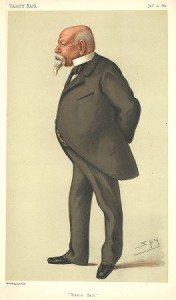
"Sam Ward's mission in Washington was to soothe the nerves and livers of unapproachable men." (Image by "Vanity Fair.")
Even those who hate Washington lobbyists probably would have liked Samuel Cutler Ward, a writer and gourmand who used his highly evolved social skills to become known in our nation’s capital as “King of the Lobby.” Ward was actually lauded during his career for using his talent for entertaining to sway votes rather than employing the time-tested method of the bribe. The New York Times provided a lengthy, admiring obituary when Ward died on May 19, 1884, and the Brooklyn Daily Eagle recalled him fondly as well. An excerpt from the Eagle’s clunky piece:
“One of the unique figures on our social stage, perhaps the most widely known and favorably regarded of Americans abroad, passed out of existence when, on Sunday Mr. Samuel Ward, universally known as Sam Ward, died in Italy. The cablegram that announced his death contained the news that he died peacefully, surrounded by friends, very much as he had lived. It is not probable that he had any enemies to speak of, for the true disciple of Epicurus has neither taste nor talent for quarreling. Yet, though he will not be missed as a man more potent in affairs would be lamented, the very fact that this amiable apostle of ease and enjoyment, of indeed a sort of supplementary evangel of sweetness and light as expressed in the important matter of refining the grosser palates and manners of his neighbors, he discharged with a great deal of comfort to himself a really important duty. He went through life seeking by intellignt inquiry into obscure conditions to mitigate its acerbities to the utmost. Bland, clever, cheerful, with a cultivated literary taste and the perfection of good manners, he made everybody comfortable with whom he came into contact, himself perhaps the most heartily satisfied of them all.
In political life his peculiar talents were turned to unexpected account. The recalcitrance of the Philistine is much more largely due to the protest of his physical organism against the outrage of his diet than is generally suspected. Sam Ward’s mission in Washington was to soothe the nerves and livers of unapproachable men in his own inimitable way. It was by a due proportion of good stories and the finest wines, of a perfect adjustment of edibles and drinkables, with sallies of neat Horatian wit, that he charmed his guests into a proper condition to listen to his arguments.”
Tags: Samuel Cutler Ward
Affetto is a robot baby that moves its face like a human. “He” has been created so that researchers can learn about social development by studying people interacting with the bot. Still, pretty creepy. (Thanks IEEE Spectrum.)
Real BUTTERFLY Taxidermy Display from Evolution NYC!! – $40 (Greenpoint/ Williamsburg)
My ex-boyfriend gave me this for my birthday and it makes me really upset to look at it so I’m selling it. If it doesn’t sell within a week or so I’m just going to throw it in the trash and pretend like it never happened (just like he did with our relationship).
Three passages from The Prairie Years, Part 1, the opening section of Carl Sandburg’s lyrical book about Abraham Lincoln’s life up until the Civil War.
••••••••••
“Offut talked big about Lincoln as a wrestler, and Bill Clary, who ran a saloon thirty steps north of the Offut store, bet Offut that Lincoln couldn’t throw Jack Armstrong, the Clary’s Grove champion. Sports from miles around came to a level square next to Offut’s store to see the match; bets of money, knives, trinkets, tobacco, drinks were put up, Armstrong, short and powerful, aimed from the first to get in close to his man and use his thick muscular strength. Lincoln held him off with long arms, wore down his strength, got him out of breath, surprised and ‘rattled.’ They pawed and clutched in many holds and twists till Lincoln threw Armstrong and had both shoulders to the grass.”
••••••••••
“The Clary’s Grove boys called on [Lincoln] sometimes to judge their horse races and cockfights, umpire their matches and settle disputes. One story ran that Lincoln was on hand one day when an old man had agreed, for a gallon jug of whisky, to be rolled down a hill in a barrel. And Lincoln talked and laughed them out of doing it. He wasn’t there on the day, as D.W Burner told it, when the gang took an old man with a wooden leg, built a fire around the wooden leg, and held the man down until the wooden leg was burned off.”
••••••••••
“When a small gambler tricked Bill Greene, Lincoln’s helper at the store, Lincoln told Bill to bet him the best fur hat in the store that he [Lincoln] could lift a barrel of whisky from the floor and hold it while he took a drink from the bunghole. Bill hunted up the gambler and made the bet. Lincoln sat squatting on the floor, lifted the barrel, rolled it on his knees till the bunghole reached his mouth, took a mouthful, let the barrel down–and stood up and spat out the whisky.”
••••••••••
Carl Sandburg on What’s My Line? in 1960:
Tags: Abraham Lincoln, Bill Clary, Bill Greene, Carl Sandburg, D.W Burner, Jack Armstrong
As the current Republican-led Congress takes aim at PBS, let’s recall Mister Rogers going to Washington in 1969. (Thanks Reddit.)
Tags: Fred Rogers, Mister Rogers
This classic photograph of a Bohemian family rolling cigars in New York in 1890 was taken by Jacob Riis for his book, How the Other Half Lives. As was usually the case with immigrant families, the entire clan, even the children, were involved in the industry, which was conducted over long hours in the cramp tenement in which they lived. It was a hard-knock life, and as the following excerpt from a 1898 article in the Brooklyn Daily Eagle about a cigar-making family makes clear, it was sometimes hard to fathom:
“CIGAR MAKER’S SUICIDE: John Wachtel, 50 years old, a cigarmaker, who lived with his wife and three children on the third floor of the tenement at 48 Morgan avenue, in the Eastern District, committed suicide there shortly after 2 o’clock this morning by shooting himself in the abdomen with a .32 caliber revolver. Wachtel had been drinking heavily for some time. Latterly he entertained the impression, which was groundless, that his oldest daughter, Abbie, was disobedient. The girl helped him to make cigars and her hours were sometimes unusually long. Wachtel for the past few weeks frequently quarreled with his wife regarding his daughter’s supposed disobedience. The mother generally took her daughter’s part and this seemed to annoy Wachtel all the more. He left the house yesterday about 2 o’clock. Wachtel did not reach home until 2 o’clock this morning. A quarrel ensued, after which Wachtel went to the front room and shot himself.”
Tags: Abbie Wachtel, Jacob Riis, John Wachtel
Her singing needs work, but yeah, nice sweater. (Thanks Found Footage Fest.)
From “Secrets of Magus,” Mark Singer’s incredibly fun 1993 New Yorker profile of sleight-of-hand genius Ricky Jay:
“Jay has an anomalous memory, extraordinarily retentive but riddled with hard-to-account-for gaps. ‘I’m becoming quite worried about my memory,’ he said not long ago. ‘New information doesn’t stay. I wonder if it’s the NutraSweet.’ As a child, he read avidly and could summon the title and the author of every book that had passed through his hands. Now he gets lost driving in his own neighborhood, where he has lived for several years—he has no idea how many. He once had a summer job tending bar and doing magic at a place called the Royal Palm, in Ithaca, New York. On a bet, he accepted a mnemonic challenge from a group of friendly patrons. A numbered list of a hundred arbitrary objects was drawn up: No. 3 was ‘paintbrush,’ No. 18 was ‘plush ottoman,’ No. 25 was ‘roaring lion,’ and so on. ‘Ricky! Sixty-five!’ someone would demand, and he had ten seconds to respond correctly or lose a buck. He always won, and, to this day, still would. He is capable of leaving the house wearing his suit jacket but forgetting his pants. He can recite verbatim the rapid-fire spiel he delivered a quarter of a century ago, when he was briefly employed as a carnival barker: ‘See the magician; the fire ‘manipulator’; the girl with the yellow e-e-elastic tissue. See Adam and Eve, boy and girl, brother and sister, all in one, one of the world’s three living ‘morphrodites.’ And the e-e-electrode lady . . .’ He can quote verse after verse of nineteenth-century Cockney rhyming slang. He says he cannot remember what age he was when his family moved from Brooklyn to the New Jersey suburbs. He cannot recall the year he entered college or the year he left. ‘If you ask me for specific dates, we’re in trouble,’ he says.”
Tags: Mark Singer, Ricky Jay
Not what I was doing as I prepared to turn 20. (Thanks Reddit.)
The Week has a pretty good summation of Time‘s article about the always provocative Ray Kurzweil. The following part seems least likely of all to occur by 2045:
“ … And we will be able to bring the dead back to life
Kurzweil envisages a world in which biotechnology and nanotechnology are so advanced that the human genome ‘becomes just so much code to be bug-tested and optimized.’ Extending your life infinitely becomes reality, as does resurrecting failed organic material. ‘Death loses its sting once and for all.’ Kurzweil hopes to bring his dead father back to life.”
Tags: Ray Kurzwei
Let’s call it a glorious stalemate.
“All Watched Over
by Machines of Loving Grace”
by Richard Brautigan, 1968.

I’d like to think (and
the sooner the better!)
of a cybernetic meadow
where mammals and computers
live together in mutually
programming harmony
like pure water
touching clear sky.
I like to think
(right now, please!)
of a cybernetic forest
filled with pines and electronics
where deer stroll peacefully
past computers
as if they were flowers
with spinning blossoms.
I like to think
(it has to be!)
of a cybernetic ecology
where we are free of our labors
and joined back to nature,
returned to our mammal brothers and sisters,
and all watched over
by machines of loving grace.
Tags: Richard Brautigan
Robert Krulwich’s blog ran an image of James C. Boyle’s odd nineteenth-century invention known as the Saluting Device, which was an automated system that would tip men’s hats for them, no hands necessary. It never caught on. An excerpt from the 1896 patent:
“Be it known, that I, James C. Boyle, of Spokane, in the county of Spokane and State of Washington, have invented a new and improved Saluting Device, of which the following is a full, clear, and exact description.
This invention relates to a novel device for automatically effecting polite salutations by the elevation and rotation of the hat on the head of the saluting party when said person bows to the person or persons saluted, the actuation of the hat being produced by mechanism therein and without the use of hands in any manner.”
Tags: James C. Boyle, Robert Krulwich
Nikola Tesla prognosticating in the New York Times in 1909:
“It will soon be possible, for instance, for a business man in New York to dictate instructions and have them appear instantly in type in London or elsewhere. He will be able to call up from his desk and talk with any telephone subscriber in the world. It will only be necessary to carry an inexpensive instrument no bigger than a watch, which will enable its bearer to hear anywhere on sea or land for distances of thousands of miles. One may listen or transmit speech or song to the uttermost parts of the world. In the same way any kind of picture, drawing, or print can be transferred from one place to another. It will be possible to operate millions of such instruments from a single station. Thus it will be a simple matter to keep the uttermost parts of the world in instant contact with each other.”
Tags: Nikola Tesla
Even in a field marked by eccentricity, mathematician Paul Erdös was an odd number. The Hungarian published more papers than any other mathematician in history, even though he never really had an official post or a home or any money. He just traveled around the world, crashed with an array of academics and worked on seemingly unsolvable problems. He hardly slept or ate. This peripatetic pattern and self-abnegation continued until his death in 1996. An excerpt from Jeremy Bernstein’s 1998 Atlantic essay, which meditates on Paul Hoffman’s biography about the monomaniacal human computer, The Man Who Loved Only Numbers:
“Around 1950, when I was an undergraduate in mathematics at Harvard, my tutor George Mackey remarked that he was having a visitation from Paul Erdös.
I had never heard of Erdös (the correct pronunciation seems to have been ‘air-dish’ although I always used ‘air-dosh’), but Mackey explained that he was a kind of mathematical troubadour. He had no actual position — not because he was not offered them, but because they would interfere with his modus operandi.
Erdös migrated rapidly among 25 or so countries. He carried all his belongings in one small suitcase and a shopping bag, the greater part of which was filled with his mathematical papers and notebooks. He had no interest in clothes and even less in money. He needed three or four hours of sleep. He would arrive at a place and announce, ‘My brain is open,’ then proceed to collaborate with any and every mathematician who could keep up with him.
His collection of interesting unsolved problems in almost every field of mathematics, but especially in the theory of numbers where he probably did his most enduring work, seemed inexhaustible. What was exhaustible was the stamina of the mathematicians he landed on. Erdös would knock at a colleague’s door. ‘Hello’ he’d begin. ‘Let n be prime and letf(n) be defined as…’ After a few days of this, friends would be ready for a vacation.”
Paul Erdös tells an anecdote about a mathematician even odder than himself:
Tags: George Mackey, Jeremy Bernstein, Paul Erdos, Paul Hoffman



